T HERE is some evidence to support the belief that the
Russian Ministry of Foreign Affairs switched its main attention from the West to the East some months if not years ago, and that it did so deliberately. The Western Powers have more recently been ' persuaded to put Asian questions at the head of the list of international issues, at least for the duration of the forthcoming Geneva conference; and they did not do so deliberately. In fact they went to Berlin determined to make progress towards a German settle- ment and to resist the Russian proposals for a wider conference on world tensions, with China represented; and they came away having failed to get their way on the German question while having engaged themselves to talk with both Russian and Chinese Communists about Korea and Indo-China at Geneva in April. This is a very dangerous situation. It is possible that the Western Powers are walking straight into a trap. They are moving on to the Russians' chosen ground— ground to which Mr. Molotov was so anxious to lure them that he actually made real concessions in the process. Thd East is still mysterious, but it is rather less mysterious to Russians and Chinese than it is to the Western Powers. In fact the whole Asian situation is full of pitfalls for the West. A few mistakes in discussion with their undoubtedly well- prepared Communist opposite numbers, and the Western Powers might lose the support of a number of Asian and Arab countries both inside the United Nations and outside it.
It is essential to sound this note of warning as loudly as possible. It was apparently not enough that many Americans should have felt uneasy from the start about this whole Russian- inspired move. That was, of course, put down to chronic American suspicions of all Communist moves. The fact that there is every reason for such suspicions, .that there is every reason to believe that both the great Communist Powers have expansive aims in . Asia, that the Western Powers are still suspected of having colonial aims there, that there is no properly concerted Western policy in Asia—all these hard and unpleasant items were forgotten. If the Communist Powers wanted a conference of Asian affairs and the Americans were not particularly keen on it, then (such are the idiotic lengths to which anti-Americanism has gone in Western Europe) the .Communists were assumed to be right and the Americans wrong. But it is still not too late to mention that many of these American suspicions were completely reasonable and that the proper Western approach to Geneva is a .very cautious approach. that it is almost embarrassing to have to mention it, to which the Western Powers have paid too little attention in their approach to Geneva. It is the principle that it is dangerous to enter into high-level international conferences without 3 clear and concerted purpose and some hope of fulfilling it. It is certainly not enough to argue that Russian and Chinese interests do not coincide at all points, that Communist China has vast political and economic problems of its own to tho solution of which the Russians can make no great contribution, that Mao Tse-tung has mysteriously disappeared from public life, and that Chinese nationalism, for which he is said to stand, is difficult to reconcile with Russian Communist imperialism, Even if there are differences between Moscow and Peking-- and it would be a miracle if there were not—it is still most likely that the two Communist Powers could agree to present a united front to the Western Powers. And it is highly unlikely that they would have agreed to come to Geneva at all if there had been any great chance of tensions betv,cen them being revealed at the conference table. It may be that the West must place some reliance in the long run on 3 divergence of Russian and Chinese interests. But as a short' run device the principle of splitting the Communist opposition has always had something unrealistic about it. To expect it to split itself in public in Geneva is rather pathetic. Naturally a close search for cracks will be made, by Press observers and others. Some may be found. But it is impossible to NO a great practical policy on such a small hope. For the moment it is the broad international horizon lila( must be scanned, not the problematical details. The Russian Government, following familiar historical precedent has turned to the East after having been blocked in the West. Even if the possibilities of an extension of Russian Communist influence in China and elsewhere in Asia were not good, they are preitY certainly better there than they are in Western Europe. There is no barrier to Communism in Asia corresponding to 1110 barrier which is Germany in Europe. Japan is not on the mainland and the Western Powers are, on the whole, even more uneasy about arousing the monster of Japanese militarisol than they are about rearming the Germans. depressing thought that some of them have been baited with good intentions. This situation is not only dangerous. It is perverse, irritating --and avoidable. For the Asian waverers there is little excuse. They only have to think a little harder to realise on which side their bread is really buttered. For the Russian and Chinese Governments the decision which would end the difficulty, or steed its end, is of course the crucial one of abandoning all aggressive aims and giving some unmistakable token of a will to Peace. That always sounds too much to ask, but it is always worth recalling, if only to draw attention to the fact that all that stands between the world and international peace is a decision by a handful of men in Moscow and Peking. As for the Western Powers they gave a hostage to fortune in Berlin, when they agreed to take part in the Geneva conference despite the fact they themselves were not fully prepared with proposals for an agreed Asian settlement. That is the situation and we shall have to make the best of it. It is just possible' that good may come out of Geneva. But it is quite certata that a great deal of care and caution will have to go into it.











































 Previous page
Previous page